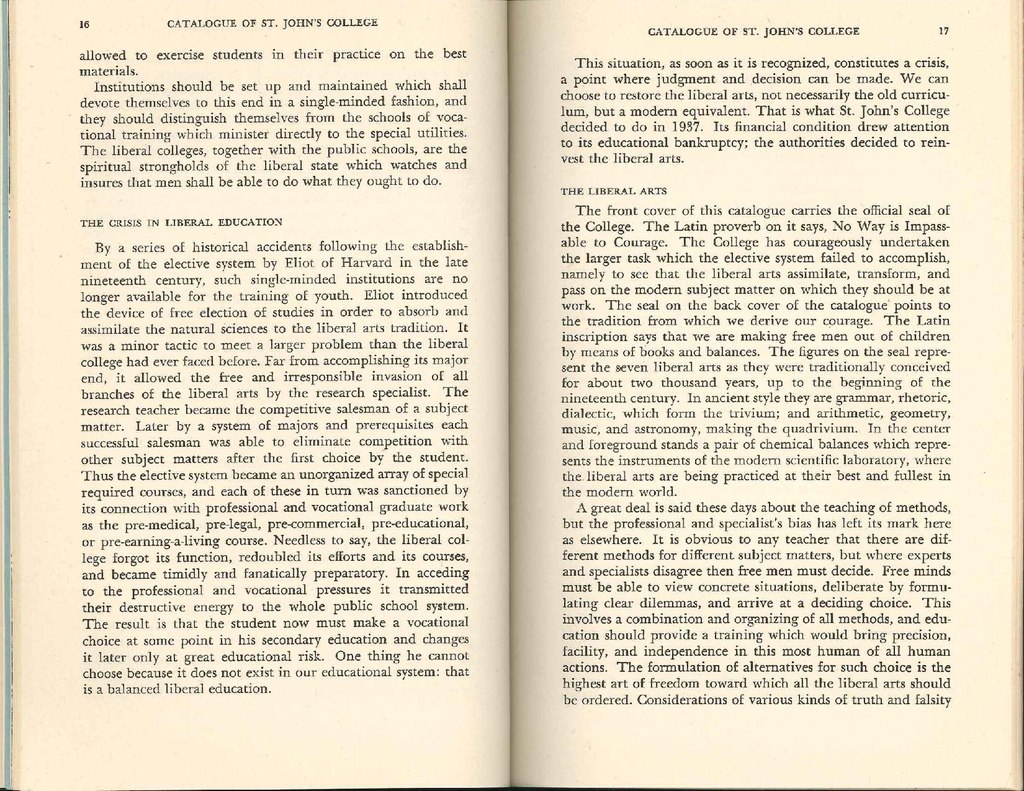allowed to exercise students in their practice on the best materials.
Institutions should be set up and maintained which shall devote themselves to this end in a single-minded fashion, and they should distinguish themselves from the schools of vocational training which minister directly to the special utilities. The liberal colleges, together with the public schools, are the spiritual strongholds of the liberal state which watches and insures that men shall be able to do what they ought to do.
the crisis in liberal education
By a series of historical accidents following the establishment of the elective system by Eliot of Harvard in the late nineteenth century, such single-minded institutions are no longer available for the training of youth. Eliot introduced the device of free election of studies in order to absorb and assimilate the natural sciences to the liberal arts tradition. It was a minor tactic to meet a larger problem than the liberal college had ever faced before. Far from accomplishing its major end, it allowed the free and irresponsible invasion of all branches of the liberal arts by the research specialist. The research teacher became the competitive salesman of a subject matter. Later by a system of majors and prerequisites each successful salesman was able to eliminate competition with other subject matters after the first choice of the student. Thus the elective system became an unorganized array of special required courses, and each of these in turn was sanctioned by its connection with professional and vocational graduate work as the pre-medical, pre-legal, pre-commercial, pre-educational, or pre-earning-a-living course. Needless to say, the liberal college forgot its function, redoubled its efforts and its courses, and became timidly and fanatically preparatory. In acceding to the professional and vocational pressures it transmitted their destructive energy to the whole public school system. The result is that the student now must make a vocational choice at some point in his secondary education and changes it later only at great educational risk. One thing he cannot choose because it does not exist in our educational system: that is a balanced liberal education.
This situation, as soon as it is recognized, constitutes a crisis, a point where judgment and decision can be made. We can choose to restore the liberal arts, not necessarily the old curriculum, but a modern equivalent. That is what St. John's College decided to do in 1937. Its financial condition drew attention to its educational bankruptcy; the authorities decided to reinvest the liberal arts.
the liberal arts
The front cover of this catalogue carries the official seal of the College. The Latin proverb on it says, No Way is Impassable to Courage. The College has courageously undertaken the larger task which the elective system failed to accomplish, namely to see that the liberal arts assimilate, transform, and pass on the modern subject matter on which they should be at work. The seal on the back cover of the catalogue points to the tradition from which we derive our courage. The Latin inscription says we are making free men out of children by means of books and balances. The figures on the seal represent the seven liberal arts as they were traditionally conceived for about two thousand years, up to the beginning of the nineteenth century. In ancient style they are grammar, rhetoric, dialectic, which form the trivium; and arithmetic, geometry, music and astronomy, making the quadrivium. In the center and foreground stands a pair of chemical balances which represents the instruments of the modern scientific laboratory, where the liberal arts are being practiced at their best and fullest in the modern world.
A great deal is said these days about the teaching of methods, but the professional and specialist's bias has left its mark here as elsewhere. It is obvious to any teacher that there are different methods for different subject matters, but where experts and specialists disagree then free men must decide. Free minds must be able to view concrete situations, deliberate by formulating clear dilemmas, and arrive at a deciding choice. This involves a combination and organizing of all methods, and education should provide a training which would bring precision, facility, and independence in this most human of all human actions. The formulation of alternatives for such choice is the highest art of freedom toward which all the liberal arts should be ordered. Considerations of various kinds of truth and falsity

